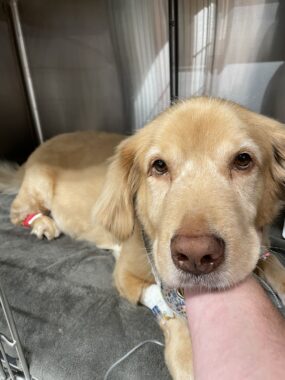My dog’s sudden illness reminded me what it means to be resilient
The crisis brought unexpected echoes from my late sister's journey with CF
Written by |

Like many others, I never want to feel like cystic fibrosis (CF) is holding me back in any way. Yet the condition has shaped many of my experiences and taught me so much, including resiliency.
At different times — mostly during periods of stability and complacency — I’ve forgotten what it means to be resilient. I’ve benefited enough from a CFTR modulator that I now get to take the longer view on my life. While that’s a great privilege, it’s also had the unintended consequence of making it harder for me to grapple with recent diagnoses, such as attention-deficit/hyperactivity disorder and CF-related diabetes.
But CF isn’t the only experience that has shaped my understanding of resiliency.
An unexpected crisis

Tré LaRosa and his dog Duncan enjoy a sunset in front of the Washington Monument. (Courtesy of Tré LaRosa)
In June 2022, I watched as multiple veterinarians dropped what they were doing to triage my dog Duncan on his eighth birthday.
Duncan would be diagnosed with immune-mediated hemolytic anemia (IMHA), an autoimmune condition in which the immune system no longer recognizes its own red blood cells and begins destroying them. In some cases, the condition can be caused by cancer or an infection, but for most dogs, including Duncan, the cause is never found.
This experience was profound for me. My health had been stable for years, and it’d been more than four years since my sister, Alyssa, who also had CF, died. For the first time in my life, health challenges were secondary to me. I felt “normal” and able to think about the future as most people do.
Then, one day, I realized Duncan was more fatigued than usual when he didn’t beg for my Chipotle. I amateurishly examined him, trying to figure out what the problem could be, before noticing his gums were especially pale. On a whim, I called an emergency vet and described his symptoms. The vet recommended I bring him in promptly.
Duncan ended up being admitted to a veterinary emergency hospital in Georgetown, Washington, D.C. During his long recovery, he was on a cocktail of medications that shockingly resembled the ones Alyssa had been on after her lung transplant in 2013. I learned that if Duncan didn’t respond to the first line of treatments for IMHA, the same options I had once obsessively researched years earlier in hopes that they’d save my sister’s life, could now be the same medications I’d hope would save Duncan’s life. This parallel felt like a cruel twist of fate.
A day earlier, Duncan had been a healthy, 7-year-old mutt. Within 24 hours, he was on death’s doorstep. The shock of his sudden decline forcefully transported me to a time when I was fixated on my sister’s and my health. I felt spurred to do whatever I could to give Duncan a chance to live a few more years. I even pleaded with Duncan as I sat by him for hours in a miniature hospital ward filled with crates. I’ve been in a lot of hospitals, and none has ever been as tragically beautiful as an emergency room for animals. It was truly one of the most devastating experiences of my life.

The author’s dog Duncan was hospitalized in June 2022. (Photo by Tré LaRosa)
I pored over any and all papers I could find about this rare and devastating condition. I learned about blood tests and red blood cells in dogs, trying to parse out how Duncan might have developed IMHA and how it might be triggered throughout the rest of his life. I determined the best diet to address his steroid-induced muscle-wasting and bought pallets of green beans to supplement his steroid-induced cravings and insatiability.
Duncan eventually made a full recovery, but during those weeks when his life hung in the balance, I was reminded just how transient life can be. During this journey, I felt a sense of responsibility unlike anything I’d ever experienced, as I wanted to do whatever I could to give Duncan the best shot at a full recovery and a happy life.
The parallels between Duncan’s and my sister’s care added even more weight to this experience. My sister demonstrated resilience throughout her turbulent life, and Duncan exemplified calm amid uncertainty. Both have reminded me that resilience means responding in challenging times — clinging to the part of us that wants to fight, no matter the odds.
Note: Cystic Fibrosis News Today is strictly a news and information website about the disease. It does not provide medical advice, diagnosis, or treatment. This content is not intended to be a substitute for professional medical advice, diagnosis, or treatment. Always seek the advice of your physician or other qualified health provider with any questions you may have regarding a medical condition. Never disregard professional medical advice or delay in seeking it because of something you have read on this website. The opinions expressed in this column are not those of Cystic Fibrosis News Today or its parent company, Bionews, and are intended to spark discussion about issues pertaining to cystic fibrosis.








Leave a comment
Fill in the required fields to post. Your email address will not be published.